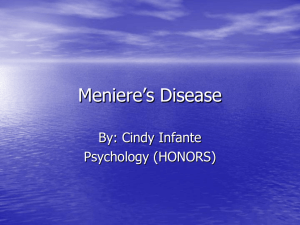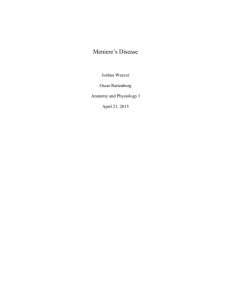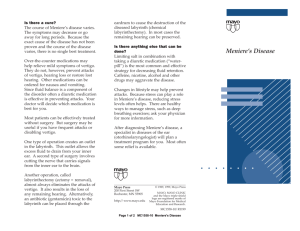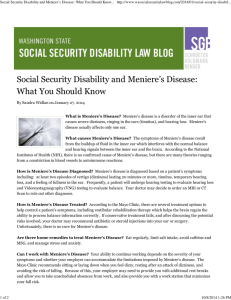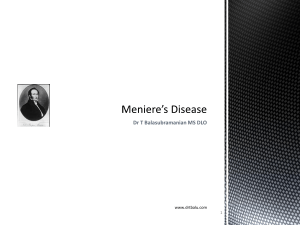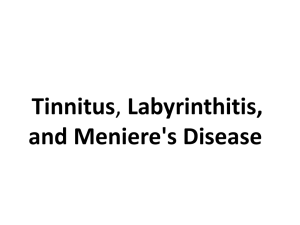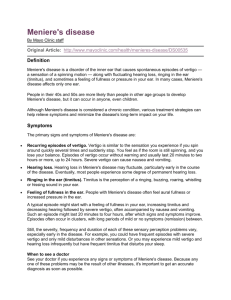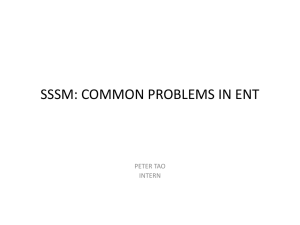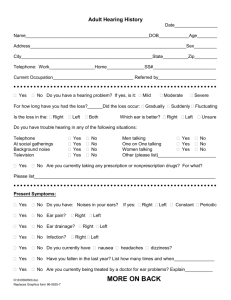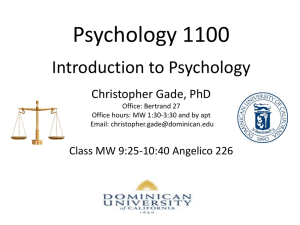The Meniere's Disease
advertisement
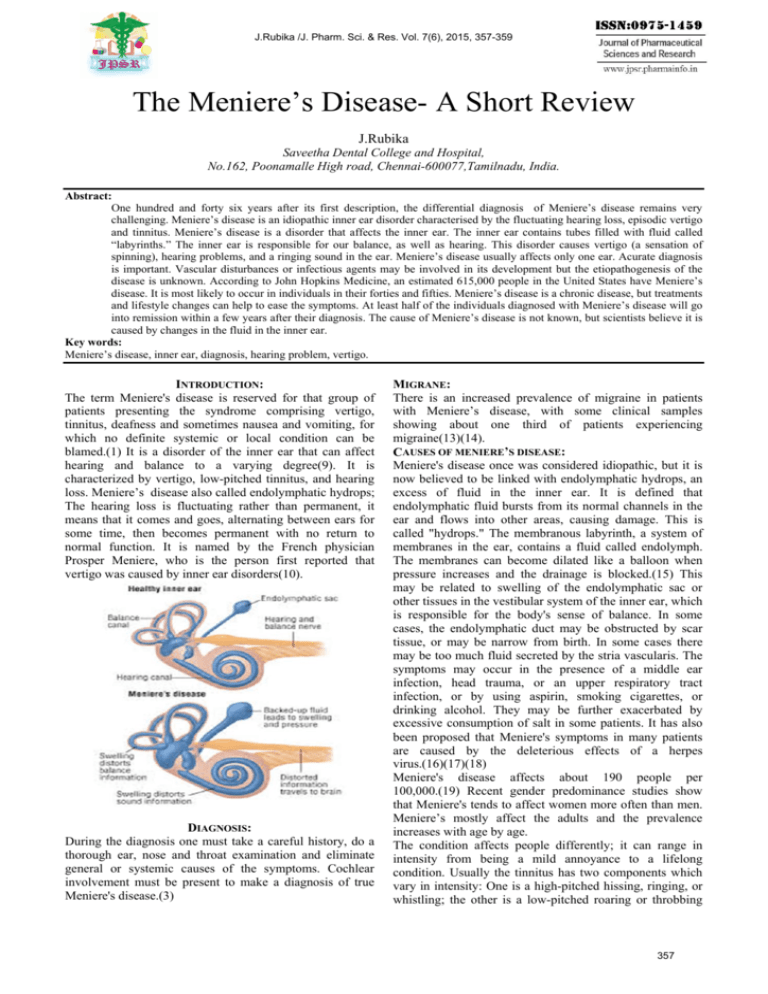
J.Rubika /J. Pharm. Sci. & Res. Vol. 7(6), 2015, 357-359 The Meniere’s Disease- A Short Review J.Rubika Saveetha Dental College and Hospital, No.162, Poonamalle High road, Chennai-600077,Tamilnadu, India. Abstract: One hundred and forty six years after its first description, the differential diagnosis of Meniere’s disease remains very challenging. Meniere’s disease is an idiopathic inner ear disorder characterised by the fluctuating hearing loss, episodic vertigo and tinnitus. Meniere’s disease is a disorder that affects the inner ear. The inner ear contains tubes filled with fluid called “labyrinths.” The inner ear is responsible for our balance, as well as hearing. This disorder causes vertigo (a sensation of spinning), hearing problems, and a ringing sound in the ear. Meniere’s disease usually affects only one ear. Acurate diagnosis is important. Vascular disturbances or infectious agents may be involved in its development but the etiopathogenesis of the disease is unknown. According to John Hopkins Medicine, an estimated 615,000 people in the United States have Meniere’s disease. It is most likely to occur in individuals in their forties and fifties. Meniere’s disease is a chronic disease, but treatments and lifestyle changes can help to ease the symptoms. At least half of the individuals diagnosed with Meniere’s disease will go into remission within a few years after their diagnosis. The cause of Meniere’s disease is not known, but scientists believe it is caused by changes in the fluid in the inner ear. Key words: Meniere’s disease, inner ear, diagnosis, hearing problem, vertigo. INTRODUCTION: The term Meniere's disease is reserved for that group of patients presenting the syndrome comprising vertigo, tinnitus, deafness and sometimes nausea and vomiting, for which no definite systemic or local condition can be blamed.(1) It is a disorder of the inner ear that can affect hearing and balance to a varying degree(9). It is characterized by vertigo, low-pitched tinnitus, and hearing loss. Meniere’s disease also called endolymphatic hydrops; The hearing loss is fluctuating rather than permanent, it means that it comes and goes, alternating between ears for some time, then becomes permanent with no return to normal function. It is named by the French physician Prosper Meniere, who is the person first reported that vertigo was caused by inner ear disorders(10). DIAGNOSIS: During the diagnosis one must take a careful history, do a thorough ear, nose and throat examination and eliminate general or systemic causes of the symptoms. Cochlear involvement must be present to make a diagnosis of true Meniere's disease.(3) MIGRANE: There is an increased prevalence of migraine in patients with Meniere’s disease, with some clinical samples showing about one third of patients experiencing migraine(13)(14). CAUSES OF MENIERE’S DISEASE: Meniere's disease once was considered idiopathic, but it is now believed to be linked with endolymphatic hydrops, an excess of fluid in the inner ear. It is defined that endolymphatic fluid bursts from its normal channels in the ear and flows into other areas, causing damage. This is called "hydrops." The membranous labyrinth, a system of membranes in the ear, contains a fluid called endolymph. The membranes can become dilated like a balloon when pressure increases and the drainage is blocked.(15) This may be related to swelling of the endolymphatic sac or other tissues in the vestibular system of the inner ear, which is responsible for the body's sense of balance. In some cases, the endolymphatic duct may be obstructed by scar tissue, or may be narrow from birth. In some cases there may be too much fluid secreted by the stria vascularis. The symptoms may occur in the presence of a middle ear infection, head trauma, or an upper respiratory tract infection, or by using aspirin, smoking cigarettes, or drinking alcohol. They may be further exacerbated by excessive consumption of salt in some patients. It has also been proposed that Meniere's symptoms in many patients are caused by the deleterious effects of a herpes virus.(16)(17)(18) Meniere's disease affects about 190 people per 100,000.(19) Recent gender predominance studies show that Meniere's tends to affect women more often than men. Meniere’s mostly affect the adults and the prevalence increases with age by age. The condition affects people differently; it can range in intensity from being a mild annoyance to a lifelong condition. Usually the tinnitus has two components which vary in intensity: One is a high-pitched hissing, ringing, or whistling; the other is a low-pitched roaring or throbbing 357 J.Rubika /J. Pharm. Sci. & Res. Vol. 7(6), 2015, 357-359 and may be synchronized with the heartbeat. The latter is often the more troublesome and annoying. SYMPTOMS: Meniere’s disease symptoms tend to come on as “episodes” or “attacks.” Most individuals with Meniere’s disease do not experience symptoms between episodes. Many of these symptoms can be caused by other problems in the ear. A patient with Meniere’s disease will experience at least two to three of the following symptoms at one time: •vertigo •hearing loss •tinnitus •aural fullness (a feeling that the ear is full or plugged). The symptoms of Meniere's are variable; not all sufferers experience the same symptoms. However, so-called "classic Meniere's" is considered to have the following four symptoms: * Attacks of rotational vertigo that can be severe, incapacitating, unpredictable, and last anywhere from minutes to hours, but generally no longer than 24 hours. * For some, prolonged attacks can occur, lasting from several days to several weeks, often causing the sufferer to be severely incapacitated.This combines with an increase in volume of tinnitus and temporary, albeit significant, hearing loss. * Hearing may improve after an attack, but often becomes progressively worse. Nausea, vomiting, and sweating sometimes accompany vertigo, but are symptoms of vertigo, and not of Meniere's. * Fluctuating, progressive, unilateral (in one ear) or bilateral (in both ears) hearing loss, usually in lower frequencies. For some, sounds can appear tinny or distorted, and patients can experience unusual sensitivity to noises. Unilateral or bilateral tinnitus. *A sensation of fullness or pressure in one or both ears. Nausea and vomiting are not always present. These two symptoms indicate acuity and severity and may necessitate hospitalization for parenteral feeding to prevent prostration in extreme cases.(2) MANAGEMENT: It is believed that since high salt diets cause water retention, it can lead to an increase (or at least preventing the decrease) of fluid within the inner ear, although the relationship between salt and the inner ear is not fully understood. High-salt intake is thought to alter the concentrations of fluid in the inner ear and Meniere’s episodes could be accelerated by high-salt binges.(20)medicine can be used to reduce nausea and vomiting antihistamines such as meclozine or dimenhydrinate, trimethobenzamide and other antiemetics, betahistine, diazepam, or ginger root. Betahistine, specifically, is of note because it is the only drug listed that has been proposed to prevent symptoms due to its vasodilation effect on the inner ear(20).The antiherpes virus drug acyclovir has been used with some success to treat Meniere's disease.(21) TREATMENT: Sufferers tend to have high stress and anxiety due to the unpredictable nature of the disease. Some patients benefit from non-specific yoga, and meditation. The partial sectioning was done on the anterior one-half to five-eighths of the nerve in an attempt to interrupt the vestibular fibers and preserve the cochlear fibers and the hearing. Better results in relief of the vertigo are obtained by complete sectioning of the nerve as no vestibular fibers are missed. The vertigo has been relieved or improved in 95to 100 per cent of these patients and the tinnitus has been partially relieved or improved more decidedly by total section than by partial section of the nerve. Hearing has been preserved in some with partial section, but these patients are also more likely to have some persistent vertigo and tinnitus. The hearing is usually not serviceable in these patients who are selected for surgical treatment; consequently little is gained by preserving it.(4) A number of operations on the end organ have been performed with varying results. It was hoped that a means of relieving the vertigo and tinnitus could be devised at this site and still preserve the hearing. injected alcohol through the oval window or a trephine in the lateral semicircular canal into the labyrinth after a mastoid approach was effected. This always destroys hearing but frequently results in a facial paralysis. They have not had as much success with this procedure as Portmann who introduced it. (5)(6)(7). A light coagulating current was applied two or three times for about one second each.He was successful in relieving vertigo with little postoperative morbidity or risk to the patient. The low-pitched tinnitus is usually relieved; the high-pitched type persists but it is not often a serious complaint. CONCLUSION: Patients with Meniere's disease who cannot be controlled by medical treatment should have the benefit of surgery. Labyrinthotomy and destruction of the membranous labyrinth has proved effective in the control of vertigo of labyrinthine origin. Changing the diet may help to reduce the amount of fluid in the inner ear and ease symptoms. Items to limit or exclude from diet include: •salt •caffeine •chocolate •alcohol •monosodium glutamate (MSG) It is also important to drink six to eight glasses of water per day, so your body is not retaining fluid. Other lifestyle remedies include: •resting during vertigo attacks •quitting smoking (nicotine can make Meniere’s disease symptoms more severe) •eating regularly (to help regulate fluids in your body) •avoiding allergens (allergies can make Meniere’s disease symptoms worse) •managing anxiety and stress through psychotherapy or medication. 358 J.Rubika /J. Pharm. Sci. & Res. Vol. 7(6), 2015, 357-359 1. 2. 3. 4. 5. 6. 7. 8. 9. 10. 11. 12. 13. 14. 15. 16. 17. 18, 19. 20. 21. REFERENCES: Day, K. M.: Surgery of labyrinth for Meniere's disease. Tr. Am. Acad. Ophth. (1943) 48: 221-230 (March-April) 1944. Lindsay, J. R.: Labyrinthine surgery for Meniere's disease. Tr. Am. Acad. Ophth. 53:527-537 (May-June) 1949. Talbott, J. H. and Brown, M. R.: Meniere's syndrome; acid-base constituents of blood; treatment with potassium chloride. J.A.M.A. 114:125-130 (Jan. 13) 1940. 10. Ray, B. S.: Meniere's disease; its surgical treatment by division of acoustic nerve. Am. J. Surg. 75:159-170 (Jan.) 1948. Yearsley, M.: Operative treatment of labyrinthine vertigo. Lancet 2:618-619 (Sept. 10) 1938. Wright, A. J.: Vertigo treated by destruction of labyrinth. Lancet 1:1165-1166 (May 21) 1938. Yearsley, M.: Further case of labyrinthectomy. Lancet 1:548-549 (March 23) 1940. Day, K. M.: Diagnosis and surgical treatment of Meniere's disease (hydrops of labyrinth). Ann. Int. Med. 23: 41-47 (July) 1945. Dictionary.com Unabridged (v 1.1). Random House, Inc. Accessed on 9 September 2008 Méniere (1861) "Sur une forme de surdité grave dépendant d’une lésion de l’oreille interne" (On a form of severe deafness dependent on a lesion of the inner ear), Bulletin de l'Académie impériale de médecine, 26 : 241. "Meniere's disease symptoms". Mayo Clinic. 2008-06-18. Retrieved 2008-10-17. Lempert, T.; Neuhauser, H. (November 2008). "Epidemiology of vertigo, migraine and vestibular migraine". Journal of Neurology 256 (3): 333–338. doi:10.1007/s00415-009-0149-2. PMID 19225823. Ibekwe TS, Fasunla JA, Ibekwe PU, Obasikene GC, Onakoya PA, Nwaorgu OG (2008). "Migraine and Ménière's disease: two different phenomena with frequently observed concomitant occurrences". J Natl Med Assoc. 100 (3): 334–8. PMID 18390027. Shin JE, Kim CH, Park HJ (2013). "Vestibular abnormality in patients with Ménière's disease and migrainous vertigo". Acta Otolaryngol. 133 (2): 254–8. doi:10.3109/00016489.2012.727469. PMID 23145969. Menieres Causes at the American Hearing Research Foundation Chicago, Illinois 2008. Shichinohe, Mitsuo (December 1999). "Effectiveness of Acyclovir on Meniere's Syndrome III Observation of Clinical Symptoms in 301 cases". Sapporo Medical Journal 68 (4/6): 71–77. Gacek RR, Gacek MR (2001). "Menière's disease as a manifestation of vestibular ganglionitis". Am J Otolaryngol 22 (4): 241–50. doi:10.1053/ajot.2001.24822. PMID 11464320. Gacek RR (2009). "Ménière's disease is a viral neuropathy". ORL J Otorhinolaryngol Relat Spec. 71 (2): 78–86. doi:10.1159/000189783. PMID 19142031. Thomas, Alexander; Jeffrey Harris (October 2010). "Current Epidemiology of Meniere's Syndrome". Otolaryngologic Clinics of North America 43 (5): 965–970. doi:10.1016/j.otc.2010.05.001. PMID 20713236. Greenberg, Simon; Julian Nedzelski (October 2010). "Medical and Noninvasive Therapy for Meniere's Disease". Otolaryngologic Clinics of North America 43 (5): 1081–1090. doi:10.1016/j.otc.2010.05.005. PMID 20713246. Shichinohe, Mitsuo (December 1999). "Effectiveness of Acyclovir on Meniere's Syndrome III Observation of Clinical Symptoms in 301 cases". Sapporo Medical Journal 68 (4/6): 71–77. 359
